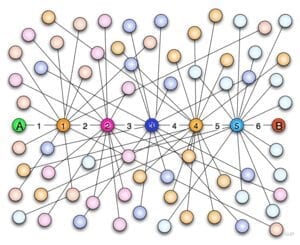We typically focus on the positive aspects of online social networks – but what about their negative aspects?
As we’re seeing in the investigation into the Boston Bombers, online social networks can rapidly transform into participatory surveillance networks, in which everyone participates, at least indirectly, in the creation of a digital surveillance state. Suddenly, our friendships on Facebook or our followers on Twitter can link us to people or content we’d rather not be linked to. The more we share online, the more likely that this will happen. In some cases, the videos you’ve watched on YouTube or the photos you’ve posted on Instagram could become the basis for a criminal investigation.
In the case of the Tsarnaev brothers, the Feds – and the rest of the Internet – are scouring their Twitter accounts for clues, hopeful of finding some clues as to why the Boston attack occurred. And, as might be expected, those online social connections eventually led them to the three individuals suspected of covering up the Tsarnaev plot. But what about the others who knew the Tsarnaevs on social media but had absolutely nothing to do with the plot? Suddenly, it seems like, it’s just Six Degrees of Separation between them and a federal detention center.
Would you un-follow someone if you knew they had been watching radical Islamic jihadist videos recently? Would you race to delete your Instagram account if a photo of fireworks might tie you to violent jihad? Perhaps. But what if that photo of fireworks was dated July 4th? Or that YouTube video was being watched as part of a classroom project?
In a digital age, when we’re increasingly defined as much by our online social networks as by our offline actions, it makes sense that investigators should not hesitate to overturn a single stone if it can help to unearth a possible terrorist conspiracy. What’s new in all this is how the rest of the Internet is essentially volunteering its time and “expertise” to help them out. That’s all good and well, but what happens in a few years when the government has built the apparatus of a surveillance state (filled with more drones, more cameras and more volunteer watchers) and then starts to suspect you of wrongdoing because of someone you’ve “friended” or “re-tweeted” in the recent past? What if you look a certain way or speak a certain language? Then, it starts to look an awful lot like social media profiling, in which having the wrong social media profile could get you picked up by the Feds.
The Latest Bing News on:
Anti-Social Surveillance Networks
- What Is a VPN and How Does It Work?on May 1, 2024 at 9:15 am
A VPN encrypts your internet traffic to keep you private online, but it can do a lot more. Here's everything you need to know about VPNs.
- Marjorie Taylor Greene Is Finally Making Good on Her Johnson Threatson May 1, 2024 at 6:36 am
Two months after announcing it, Representative Marjorie Taylor Greene claims she’s finally going to file a motion to vacate House Speaker Mike Jonhson sometime next week.
- How the push to ban TikTok spurred a new Washington influence machineon May 1, 2024 at 4:24 am
The tech moguls behind the Hill and Valley Forum are expanding beyond TikTok, prepping a proposal to dismantle President Biden’s artificial intelligence rules.
- iMessage’s Lock On America—Is This Really The Beginning Of The End?on May 1, 2024 at 3:30 am
This has been coming—but it’s accelerating quickly. WhatsApp taking on iMessage in the US was “a once unthinkable prospect,” according to Kantrowitz. “Perhaps this ends with WhatsApp assuming the ...
- How China’s citizens are coping with digital surveillanceon April 29, 2024 at 1:30 pm
State surveillance of citizens is growing all over the world, but it is a fact of everyday life in China, where it has deep historical roots.
- Election Updates: Omar draws criticism for suggesting some Jewish students are ‘pro-genocide.’on April 29, 2024 at 4:21 am
Libre, part of the political network created by the billionaire industrialist Koch brothers, on Monday will unveil a seven-figure voter engagement effort and ad campaign targeting members of Congress ...
- Arrests continue Saturday as pro-Palestinian protests embroil US collegeson April 27, 2024 at 2:01 pm
Students across the country continued to protest Israel's war in Gaza at major universities following hundreds of arrests.
- Should You Worry About The H5N1 Bird Flu? Here Are The Concernson April 27, 2024 at 10:10 am
The H5N1 highly pathogenic bird flu virus has been spreading among dairy cows, and fragments of avian influenza have appeared in milk being sold at stores.
- Australian police and media fuel anti-Islamic witch hunt to justify arrests of teenagers on flimsy “terrorism” chargeson April 26, 2024 at 9:32 pm
Today’s Australian splashed over its front page “exclusive” stories demonising arrested Islamic boys, apparently based on prejudicial leaked police information.
- Why the Taliban Love Social Mediaon April 24, 2024 at 3:40 am
Hamed Latifee launched the YouTube channel Afghanistan Streets in 2023 to portray daily life in the country under Taliban rule. His videos often featured tours of construction sites, shops, or trips ...
The Latest Google Headlines on:
Anti-Social Surveillance Networks
[google_news title=”” keyword=”Anti-Social Surveillance Networks” num_posts=”10″ blurb_length=”0″ show_thumb=”left”]
The Latest Bing News on:
Surveillance Networks
- IIT-K ready for fourth batch of eMasters degree in Cyber Securityon May 2, 2024 at 1:02 am
IIT Kanpur, ranked among the top four engineering colleges in India, has opened its doors to the fourth batch of eMasters programme in Cyber Security.The programme prepares cyber ...
- Ighty Support is Boosting Small Business Growth with Managed IT Services, Data Cabling, and Securityon May 1, 2024 at 9:53 pm
Small businesses need technology service providers for survival and future growth in the market. Ighty Support and its sister companies bring ...
- EasyDMARC Forms Strategic Alliance with Bloomfield Networks to Enhance Email Securityon May 1, 2024 at 2:00 pm
EasyDMARC has entered into a strategic partnership with Bloomfield Networks, a New Jersey-based managed service security provider. This collaboration is set to offer Bloomfield Networks’ clientele ...
- Camera by camera, North Carolina police build growing network to track vehicleson May 1, 2024 at 9:16 am
Roadside surveillance cameras now stand in dozens of North Carolina communities. If you haven’t seen them, they’ve likely seen you.
- Behind the Scenes of Palo Alto Networks's Latest Options Trendson May 1, 2024 at 8:16 am
Options trading presents higher risks and potential rewards. Astute traders manage these risks by continually educating themselves, adapting their strategies, monitoring multiple indicators, and ...
- Belgium's Aikido lands $17M Series A for its 'no BS' security platform aimed at developerson May 1, 2024 at 6:52 am
Now, Aikido, a small startup in Ghent, Belgium, thinks it has an answer to that dilemma: A no-nonsense, open-source, developer-facing security platform. With other tools, the CSO is the buyer, but ...
- Arista targets lateral security threat in campus and data center networkson May 1, 2024 at 5:42 am
Arista Networks is bolstering a key part of its security software with new features that help customers reduce the blast radius of security breaches by setting up 'microperimeters' to restrict lateral ...
- Network security startup Corelight reels in $150Mon April 30, 2024 at 1:54 pm
Corelight Inc., a startup using open-source tools to detect malicious traffic in enterprise networks, today disclosed that it has closed a $150 million Series E funding round.
- Palo Alto Networks launches Prisma SASE 3.0 for enhanced device securityon April 30, 2024 at 5:15 am
Palo Alto Networks Inc. today announced Primsa SASE 3.0, a new solution that offers comprehensive security and performance for both managed and unmanaged devices.
- How China’s citizens are coping with digital surveillanceon April 29, 2024 at 1:30 pm
State surveillance of citizens is growing all over the world, but it is a fact of everyday life in China, where it has deep historical roots.
The Latest Google Headlines on:
Surveillance Networks
[google_news title=”” keyword=”Surveillance Networks” num_posts=”10″ blurb_length=”0″ show_thumb=”left”]












